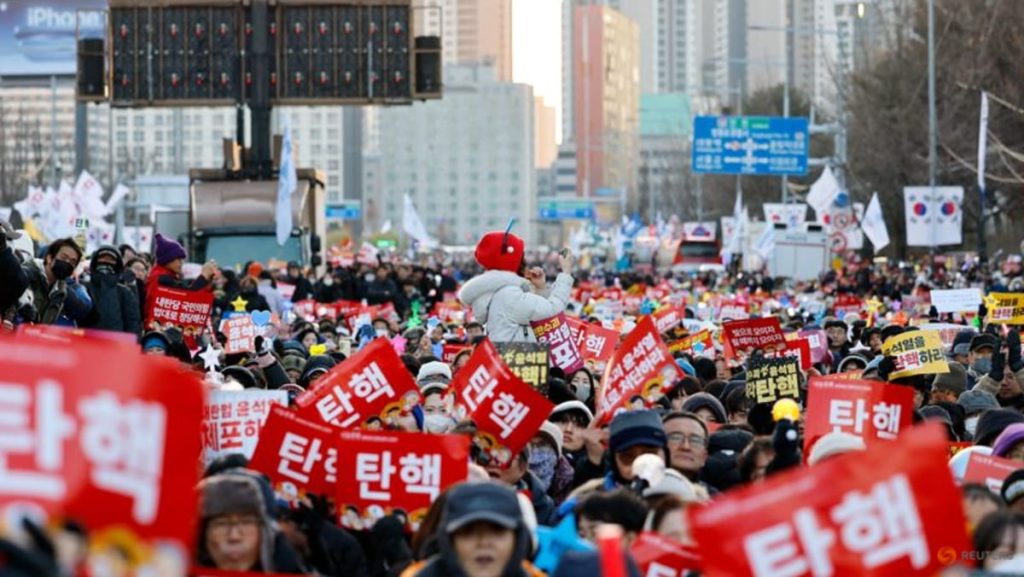The Impeachment of Yoon Suk-yeol and the Future of South Korea
The impeachment of South Korean President Yoon Suk-yeol has sent shockwaves through the nation, raising profound questions about the country’s political trajectory. While the immediate consequences of the impeachment are still unfolding, the long-term implications for South Korea’s political landscape, social fabric, and national security are likely to be substantial. Five key areas stand out as particularly vulnerable to significant transformation in the wake of this political earthquake.
1. Political Reform and the Balance of Power: The impeachment has reignited the debate surrounding the concentration of power in the South Korean presidency. The current constitutional framework grants extensive authority to the president, a situation that many critics argue is ripe for abuse. The impeachment proceedings have lent credence to these concerns, accelerating calls for political reform. Two primary proposals have emerged: transitioning to a parliamentary system, which would distribute power more evenly among legislative bodies, or reducing the presidential term to four years with the possibility of re-election. Both options aim to curb presidential power and enhance checks and balances within the government. The outcome of this debate will significantly impact the future balance of power in South Korea.
2. Political Polarization and the Erosion of Civil Discourse: South Korea’s vibrant democracy has long been characterized by intense political polarization. While this dynamism can contribute to vigorous debate, it has also led to a toxic political climate marked by partisan gridlock and a lack of substantive progress. The cycle of political retribution, where incoming administrations target their predecessors, has become deeply entrenched. This pattern not only discourages compromise and cooperation but also undermines public trust in the political system. The impeachment of Yoon Suk-yeol further exacerbates this polarization, intensifying societal divisions. Many citizens align themselves with political parties and figures with an almost religious fervor, viewing them as saviors or martyrs in a constant battle against opposing forces. This polarized environment, fueled by political rhetoric, hinders constructive dialogue and threatens the very foundations of South Korean democracy. The responsibility for healing this divide rests squarely on the shoulders of the political class.
3. The Military’s Role and Legitimacy: Yoon’s invocation of martial law, though ultimately unsuccessful, raised serious concerns about the potential politicization of the military. While fears of military intervention in domestic politics have long simmered within certain segments of South Korean society, Yoon’s actions transformed these fears into a legitimate concern. The perception that the military could be used as a tool for political ends undermines its credibility and erodes public trust. This development carries significant implications for a nation technically still at war with North Korea. A strong and well-disciplined military is crucial for South Korea’s national security. The erosion of the military’s legitimacy could negatively impact its operational effectiveness and morale, potentially jeopardizing the country’s defense capabilities.
4. The Future of the Conservative Party and the Balance of Power: The impeachment has dealt a severe blow to South Korea’s conservative party, which has been embroiled in internal power struggles since the impeachment of Park Geun-hye. Following a string of electoral defeats, Yoon’s impeachment further fractures the party, potentially paving the way for dominance by the opposition Democratic Party, which already controls the National Assembly. While a healthy democracy requires a robust opposition to ensure checks and balances on power, the disintegration of the conservative party could create an imbalance in the political landscape. The survival of the conservative party hinges on its ability to regain public trust through genuine self-reflection and a commitment to reform. The party must confront its internal divisions and articulate a clear vision for the future if it hopes to remain a viable political force.
5. Economic Stability and International Relations: While not explicitly mentioned in the initial text, the political instability caused by the impeachment could also have repercussions for South Korea’s economic performance and its standing on the international stage. Uncertainty surrounding the political leadership can negatively impact investor confidence and market stability. Furthermore, South Korea’s ability to effectively navigate complex geopolitical challenges, including relations with North Korea and its role in regional alliances, could be hampered by internal political turmoil. The new leadership will face the daunting task of restoring stability and projecting an image of strength and unity to the international community.
The Road Ahead: The impeachment of Yoon Suk-yeol marks a critical juncture in South Korea’s history. The nation faces a complex and uncertain future, with significant challenges ahead. Addressing the underlying issues of political polarization, reforming the political system, and restoring public trust in institutions are crucial for ensuring the long-term health of South Korean democracy. The choices made in the coming months and years will determine whether this period of upheaval leads to a stronger, more resilient democracy or further exacerbates existing divisions and vulnerabilities.

